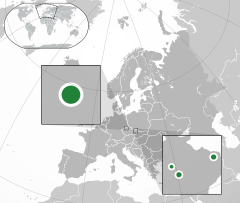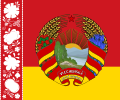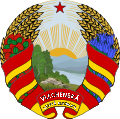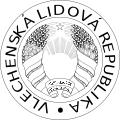People's Republic of Vlechenia
| Motto: Ani krok zpět! (Czech) Not a step back! (English) Ни шагу назад! (Russian) | |
 Controlled territory | |
| Status | Active |
| Location | Central Europe |
| Capital | Svornov |
| Official languages | |
| Recognised national languages | Czech |
| Recognised regional languages | Czech, Polish |
| Ethnic groups | Czech, Polish |
| Religion | Secular state |
| Demonym(s) | Vlechenian |
| Government | Unitary presidential one-party socialist republic |
| Peter Simon Malček | |
| Martin Brožek | |
| Legislature | Assembly of Worker's Councils |
| Independence from the Czech Republic | |
• Establishment of People's Republic of Vlechenia | 19 March 2023 |
| Area | |
• | 15 km2 (5.8 sq mi) (215) |
• Water (%) | 0 |
| Population | |
• Estimate | 5+ |
| HDI (2023) | very high |
| Time zone | UTC+1 (CET) |
• Summer (DST) | UTC+2 (CEST) |
| Date format | mm/dd/yyyy |
| Driving side | right |
| Calling code | +420 |
| IMSO 1 code | VLN |
| Internet TLD | .vln (proposed) |
The People's Republic of Vlechenia (Czech: Vlechenská lidová republika) also known by its short-form name, Vlechenia (Czech: Vlechensko) declared its independence on 19 March 2023, is a de facto landlocked autonomous region that claims to be a sovereign state, commonly known as a micronation. Located in the in Central Europe. The nation is comprised of four regional territories: Albia Oblast, Hvězdov Oblast, Svornov Oblast, Štrougalov Oblast bordering the Czech Republic. Vlechenia has lowland Landscape that covers an area of 15 km² with a mostly temperate continental and oceanic climate. The nation's capital and largest city is Svornov. The official language of republic is Czech, Slovak and English. In addition Polish is spoken and understood by many residents.
Vlechenia is unitary presidential one-party socialist republic headed by a president with significant executive power, who also presides over Council of People's Commissars. He acts as Head of state and Head of government. Administration is handled by the Central Committee which also supervises the performance of the executive and legislature processes in state. It also deals with issues related to ideology. Parliament is of unicameral type, consisting of Assembly of Worker's Councils, which deputies are elected from each state company to represent their workplace and interest of local workers.
Many similarities and history is shared with Czech republic and former Lands of Bohemian crown. The vast majority of laws and legislative regulations come from the times when the country was part of the Czech Republic. People's Republic of Vlechenia became independent on 19 March 2023 on the basis of self-determination and right to choose to have any citizenship. Charter on The Declaration of Independence of the People's Republic of Vlechenia legalised transition of Vlechenia to sovereign state and it was created and ratified by Council of People's Commissars. Preparations to declare independent started on 1 March 2023.
Vlechenia is developing country with almost no economic resources as it does not collect taxes and does not export any goods. However Government with help of Vlechenian National Bank and Central Committee draft plans to start the economy by first creating state reserves and official currency.
Etymology and National symbols
The name Vlechenia derives from german: Flachland, which stands for low lands. The current English name comes from the Czech ethnonym associated with the area as Vlechenia has mostly flat territory. Several different derivations were proposed in the beginning of creation of the state as Vlachenia, Vlechia and Flesia being options most discussed. The adjective People's Republic comes from the form of government.
The National symbols of the Vlechenia are The National Flag, the Presidential Standard, The Coat of arms, The Seal, The strawberries , The Tulips, the national anthem.
-
National Flag
-
Presidential Standard
-
Coat of arms
-
State Seal
-
Strawberries
History

Before declaring independence
Territory of nowadays People's Republic of Vlechenia was in the past part of the Czech republic and before that, Lands of Bohemian crown. None of individual parts that are now integrated in Vlechenia had ever existed as sovereign state in any form before as they were under either German or Czech administration, at the same time these regions undergone many changes in terms of development but also exploitation. In the territory of Vlechenia, various forms of government alternated from fascism to communism and democracy in last century, most of them being ineffective.
Events surrounding the foundation of state
Declaration of independence of People's Republic of Vlechenia as sovereign state took place on 19 March 2023. Discussions about the founding of Vlechenia had already been going on since 1 March 2023, Provisional Council of People's Commissars was formed by that time and started the preparations. The impetus for the creation of a new state was the unification of the integrity and prosperity of the citizens, giving them an alternative to current government in Czech Republic. The Charter on The Declaration of Independence was created, which was subsequently ratified by representatives of Provisional Council of People's Commissars. The Charter is based on the Charter of Fundamental Rights and Freedoms and calls for the right to self-determination.
The Provisional Council of People's Commissars consists of 5 members, who are actively involved in the measurement of the territory, the distribution and transfer of political power in legislative and executive branch, the statute and the preparation of legal documentation. Peter Simon Malček was appointed to the position of Chairman of the Provisional Council of People's Commissars thus becoming the head of state - president and was entrusted with the administration and preparation of a new goverment system. The second most significant position is General Secretary, currently hold by Martin Brožek.
Governance
The People's Republic of Vlechenia is presidential republic with unicameral parliament, where president as head of state holds significant executive and legislative power. Until Constitution is passed down and ratified by parliament, the state is governed by Provisional Council of People's Commissars which is responsible to citizens and party. Council is formed by President who is elected by direct secret vote.
Legislature
The Supreme People's Assembly has legislative power and has three functions: representing the electorate, making laws, and overseeing the Provisional Council of People's Commissars via hearings and inquiries. It alone possesses legislative supremacy and thereby ultimate power over all other political bodies in the Vlechenia. It is necessary to obtain more than 50% of the vote for a law, and more than 60% of the votes for constitutional laws. The Assembly of Worker's Councils has the power to declare a state of war and martial law. Assuming corruption or any other offense is proven to a public official, whatever position he is stripped of all mandates. The Assembly of Worker's Councils cannot be dissolved.
The Chairman of Supreme People's Assembly also referred to as the Speaker, is an elected presiding member of the Supreme People's Assembly of Worker's Councils. The main tasks of the chairman include representing the Assembly externally, managing it and presiding over its meetings.
Executive
The Provisional Council of People's Commissars exercises executive power in the People's Republic of Vlechenia. The council is led by president, who selects all the other ministers. President also appoints members of Council who do not directly intervene with any resort, but represent party ideology and acts as overseers. Ministers are responsible to the President and citizens. There are at the moment 7 Ministries following: Ministry of interior, Ministry of foreign affairs, Ministry of justice, Ministry of finance, Ministry of health, Ministry of defence, Ministry of culture.
The President presides over the Provisional Council of People's Commissars, holds the executive and legoslative power, acts as head of state and selects ministers. His function is to pass laws but he can also propose them, also veto either bills. The president convenes a session of the Provisional Council of People's Commissars. It can issue so-called Presidential decrees, which must comply with the legal system of the country, i.e. they are sub-statutory regulations.
The General Secretary is the second most significant member of Council of People's Commissars and holds the office of vice-president, he represent the party view on actions taken by Council and oversees that individual reforms are based on party's ideology.
Administrative divisions
Municipal jurisdiction / lower administrative districts
There are few municipalities and towns in the Vlechenia, which take care of lower administrative administration and are headed by municipal councils elected by secret ballot in direct elections, according to the law. each municipality has a district of administrative and cadastral jurisdiction according to needs and capability of administration. Municipalities and their representatives exercise such transfer of state power as has been transferred to them from a higher administrative district.
Oblasts / higher administrative districts
Vlechenia is unitary state with 4 adiministrative districts, which are collectively referred to as Oblasti. They hold the highest transferred competence right after the state and are above all municipalities. Districts are administered by district assemblies, which are elected by secret ballot in direct elections.
| Flag | Coat of Arms | Name | Oblast code | Oblast capital | Population | |
|---|---|---|---|---|---|---|
| Oblasts | ||||||
| Albia Oblast | ALB | Albia | 2 registered citizens | |||
| Hvězdov Oblast | HVZ | Hvězdov | 1 registered citizens | |||
| Svornov Oblast | SVR | Svornov | 2 registered citizens | |||
| Štrougalov Oblast | ŠTL | Štrougalov | 2 registered citizens | |||









